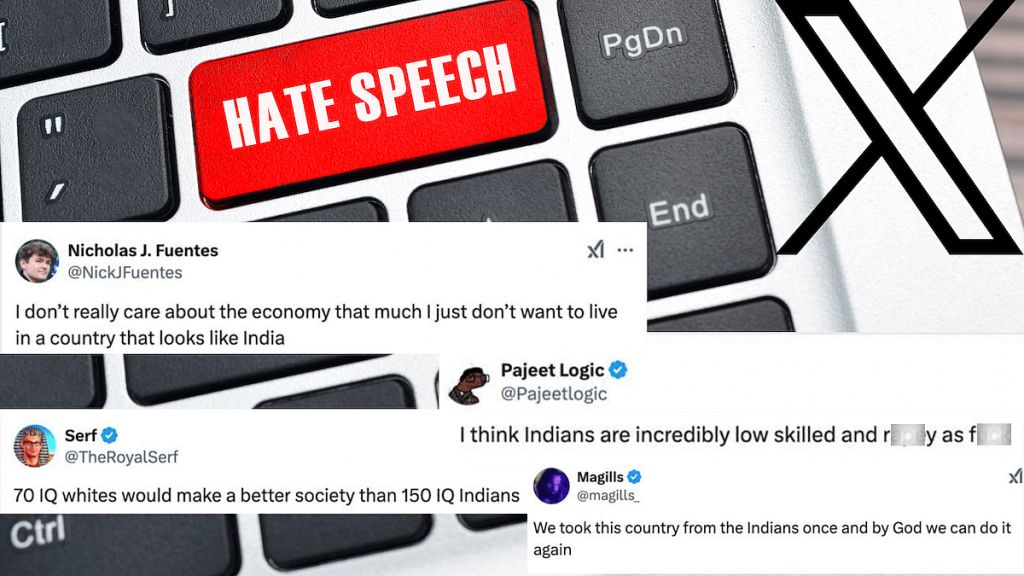
Washington D.C.-based think tank, the Center for the Study of Organized Hate (CSOH) has published a new report that documents a surge in anti-Indian posts on the social media platform X between December 22, 2024, and January 3, 2025.
The researchers identified the hateful posts as a backlash to the December 22 appointment of Indian-American venture capitalist Sriram Krishnan as the new White House Senior Policy Advisor for AI and Vivek Ramaswamy’s post on X, about American culture and mediocrity on December 26.
The report, titled ‘Anti-Indian Hate on X: How The Platform Amplifies Xenophobia and Racism’ analyzed 128 posts that garnered 138.4 million views. The report found that many of the posts violated X’s policies on hateful conduct, but remained active on the platform.
The Great Replacement Theory
The posts mainly reflect right-wing social media users’ resentment against the H-1B visa system, through which many Indians live and work in the United States. Both Krishnan and Ramaswamy have been vocal about their support for the H-1B system. Prominent far-right personalities like Laura Loomer also criticized Trump’s appointment of Krishnan for this reason.
The report states, “Loomer opposed Sriram’s appointment as antithetical to the nativist principle of ‘America First,’ a MAGA talking point, on grounds that he had called for removing green card caps and that he wanted to grant science, technology, engineering, and math (STEM) jobs to immigrants that ‘rightfully’ belonged to Americans.”
Deeksha Udupa, co-author of the report said that while many of the posts targeted H-1B visa holders, they are representative of a larger anti-immigrant sentiment among the far-right base of Trump supporters.
“There is this greater narrative of the Great Replacement Theory, which is that at any capacity, an immigrant will come and take your job, and the only person ‘deserving’ of that job is a white American,” said Udupa. “This is a moment when we are realizing that it doesn’t matter how you come here… you will not fit into Trump’s America.”
In the report, Udupa and the other authors also note that these hateful posts attacked all persons perceived to be of Indian origin, and not just Hindus. Earlier, Democratic Congressman Rep. Shri Thanedar from Michigan’s 13th District reacted to the surge in anti-Indian hate on social media by posting about his bipartisan bill to combat Hinduphobia.
On this, the report states, “These attacks are not exclusively aimed at Hindus, whether of Indian or American origin. Rather, the attacks are directed at everyone perceived to be of Indian origin, which, as our analysis reveals, also includes members of the Sikh community.”
“Hate sells”
The report found that a majority of these posts violated X’s Hateful Conduct policies, specifically ‘inciting fear or spreading fearful stereotypes about a protected category’; slurs and tropes; and dehumanization.
Report authors came across posts referring to Indian immigrants as an invasion; Indians as unhygienic; calls to clean America; as well as anti-Indian slurs like ‘curry’ and ‘pajeet’.
However, these posts still remained active on the platform, racking up millions of views. As of January 3, 2025, 125 of the 128 posts, and 84 of 85 accounts were still active. Alarmingly, some of the extremist and hateful posts were under the category of “restricted monetization,” meaning creators can monetize the posts and earn money off them.
“Hate sells,” said Udupa. “At least for X, its business model has basically incentivized hate speech. Because it is not quality or content that is privileged, it is views, reach, visibility and engagement.” Previously, the Elon Musk-led platform has been criticized for allowing neo-Nazi hate speech to flourish. Now, the CSOH report shows that anti-Indian hate speech is also rampant.
The report recommends that X should identify and prohibit the use of relatively newer anti-Indian slurs like the word pajeet, and prohibit monetization on any hateful posts.
“I think we need to understand that algorithms are not apolitical, they’re a vehicle for a message,” said Udupa.